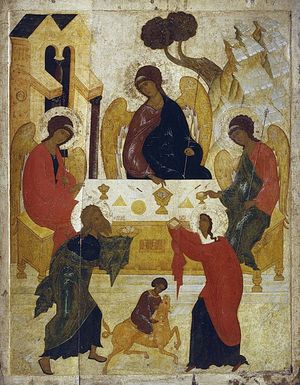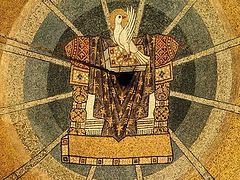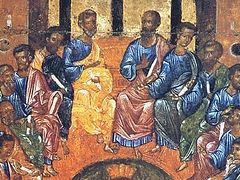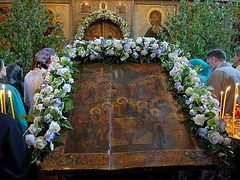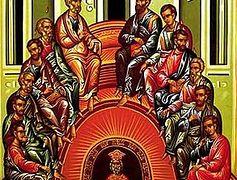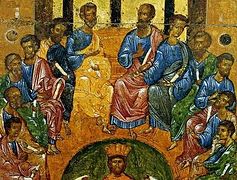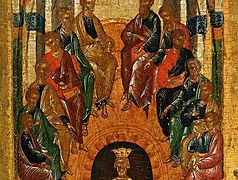We are about to partake in the services for Holy Pentecost, as the Church celebrates the descent of the Holy Spirit on the Disciples. The Matins service is especially notable for Canon II, a monument of ecclesiastical poetry. We offer this commentary on that canon by liturgical scholar Deacon Vladimir Vasilik. The excerpts from the canon are from the translation by Archimandrite Ephrem Lash.
We offer to our readers for their attention translations of the second canon for Pentecost. It was written in a meter that it rather rare for Byzantine Church poetry—the six-meter iambic—twelve-complex measure, where the accent falls on every second syllable. Recognized as the author is the great defender of Orthodoxy, St. John of Damascus (†753). True, the traditional manuscript shows another author—John of Arklas. This name shows up in a number of manuscripts, including the most ancient, such as the unique Triodion of the ninth century from the Manuscripts department of the Russian Academy of Sciences Library (collection of the Russian Archeological Institute, No. 109), which the author of this article studied. However, there is no contradiction here: Arkla is the name of a region located not far from Damascus (the word itself means a provincial treasure trove); and correspondingly, the nickname, “of Arkla” is a synonym of the word “Damascene”. Therefore, we have a right to suggest that the canon reflects the theology of St. John Damascene implanted in his works, including in the “Exact Exposition of the Orthodox Faith”.
Many similar conformities can be found. For example, the third troparion of the fourth Ode:
As many as are worshippers of the Essence with Triple
Light,
All be consecrated to the Godhead.
For, as our Benefactor, Christ perfects
supernaturally
And lights a fiery torch for our
salvation,
Furnishing all the grace of the Spirit.
Let us compare this with a fragment from the “Exact Exposition of the Orthodox Faith”: [He is] the shepherd of those who follow and are tended by Him: the radiance of those who are enlightened: the initiation of the initiated: the deification of the deified: the peace of those at discord: the simplicity of those who love simplicity: the unity of those who worship unity: of all beginning the beginning, super-essential be cause above all beginning: and the good revelation of what is hidden, that is, of the knowledge of Him so far as that is lawful for and attainable by each (Book 1, chapter 12).[1]
Let us note that the term, “Godhead”, hails back to the works of St. Dionysius the Aeropagite, who had a perceptible influence on both the “Exact Exposition” and the second canon for Pentecost.
The Triadology of the canon for Pentecost has its roots in the Nicaea-Constantinople exposition in the works of the great Cappadocian fathers, as well as of St. Cyril of Alexandria. There is particular emphasis in the canon on the single essence of the Divine Hypostasis, Their unity and equality:
All things bend the knee to the Advocate,
To the Offspring of the Father, to the
consubstantial Father;
For they know unerringly in three
Persons
One, unapproachable, timeless Essence;
For the grace of the Spirit has caused light to
shine (Ode 4, trop. 2).
In the canon, the difference is clearly set forth between the eternal proceeding of the Holy Spirit from the Father and His Son, sent within time to the world:
As he was well-pleased, of his own authority
The un-mastered Spirit comes down from the
Father,
Making the Apostles wise with tongues,
Might of the Father, one in form, setting the
sea
Upon the life-bearing word, which the Saviour spoke
(Ode 5, trop. 1)
Monarch of monarchs, Alone from the
Alone,
Word issuing from the Father who has no
cause,
As Benefactor you have unerringly sent
out
To the Apostles your Spirit, equal in
strength,
As they sing, ‘Glory to your might, O
Lord!’ (Ode 4, Irmos)
The canon for Pentecost is important to us not only because of its triadology, but also its Christology, and mystagogy.
Having by a word mixed the divine bath of rebirth
With a compounded nature,
You rain down upon me a stream from your
immaculate,
Pierced side, O Word of God,
Sealing me with the fervour of the Spirit (Ode 4,
trop. 1).
This troparion interests us primarily by its formula, “One compounded nature”. This formula goes back to St. Cyril of Alexandria. Let us look at one of the more characteristic passages from the work, “On the Worship of God in Spirit and in Truth.” Discussing why the law prescribes compound fragrances, the holy hierarch says, “Compound fragrances are used because the Real God, the Word became flesh. And Emmanuel is composed of Divine nature and humanity in one, ineffably combined.”[2]
The above-cited troparion from the canon for Pentecost is important to us because it raises a fundamental theological (and for medieval man, also an indirectly societal) problem—Christ’s redemptive death and its significance for man’s salvation. In it is the teaching on Baptism, as well as on the Eucharist; and the influence can be noted here of the rite of “hot water” introduced in the sixth century under Emperor Justinian to confirm St. Cyril’s Christology. The rite of hot water had an important liturgical and theological-polemical meaning. It refers to the pouring of hot water into the Eucharistic chalice, with the words: “The warmth of faith, filled with the Holy Spirit.” This rite was quite important inasmuch as it testified to the abiding of the Holy Spirit in the body of Christ as it lay in the tomb. The warmth of the Spirit transforms physical nature; and the very name, zesis—“warmth”—was symphonic with the word “life”—zoe. Just as when the body of Christ, due to the activity of the Spirit, becomes incorruptible in the tomb, so also does the Spirit sanctify the bread and make it the body of Christ, and to this the rite of hot water alludes.[3] Later, polemic ensued between the Orthodox, Latins, and Armenians in connection with this rite.[4]
This troparion from the canon for Pentecost has an obvious parallel with the canon of St. Andrew of Crete (Ode 4, troparion 20).
May the Blood from Thy side be to me a cleansing fount, and may the Water that flows with it be a drink of forgiveness. May I be purified by both, O Word, anointed and refreshed, having as chrism and drink Thy words of life.[5]
The hymnographic texts cited here speak of the rootedness not only of the Eucharist, but also of Baptism in the sacrifice on Golgotha offered by Christ. They are closely tied with the teaching on the Eucharist and Baptism contained in the “Commentary on the Gospel of John” by St. Cyril of Alexandria: “After some time, not believing that he had already died, his side is pierced by a spear, and from it flows blood mixed with water, for God offered to us what happened as a certain image and source of mystical blessing and holy Baptism. For, verily, holy Baptism is of Christ and from Christ, and the power of the mystical blessing grew out of His holy flesh.[6]
Even this brief excursion gives us an appreciation of the depth and meaning of the second canon for Pentecost. A full-fledged study of it would hardly fit the format of an Internet publication and would require separate expanded research.
Because the full glory of this profound canon is necessarily quite difficult to render into English, we include here two different translations, without any recommendation of one over the other. The first is by prominent liturgical translator Archimandrite Ephrem (Lash), taken from his website of liturgical and patristic translations. His own commentary on the canon can be found on the original page. The second is from the Pentecostarion by the prolific translator Isaac Lambertsen, whose works are well known to us in the liturgical publications of the St. John of Kronstadt press.
THE CANON
In Iambics, whose acrostic is contained in the following elegiac couplets:
Only-begotten of God, from the heart of the Father you
sent to
Those upon earth once again other Advocate, Spirit
divine,
Bringing, in tongues made of fire, of the pure,
immaterial Godhead,
Sign of your nature and grace for those who are
minstrels of praise.
A Composition of Kyr John Arklas.
Ode 1. Tone 4. Irmos.
The slow of tongue, covered in divine darkness,
Proclaimed the law written by God;
For shaking the dust from his mind’s
eye,
He sees the One Who Is, and is
initiated
Into knowledge of the Spirit, praising with songs
inspired.
Troparia
The revered and august mouth spoke,
’For you my friends there will be no
parting.
For I, once seated with him on my Father’s
lofty throne,
Will pour out the copious grace of the
Spirit
To shine on those who yearn’.
The firm Definition, most precise Word,
Brings calm perfection to the heart;
For, his work accomplished, Christ gladdened his
friends,
With a mighty wind and tongues of fire,
Apportioning the Spirit, as he had promised.
Ode 3. Irmos.
Only the prayer of Anna, the prophetess
Of old, who brought a broken spirit
To the Mighty One and God of knowledge,
Broke the fetters of a childless womb
And the harsh insult of one with many
children.
Troparia
Inapprehensible is the Godhead;
For it revealed the unlettered to be
orators,
Bridling the mouths of sophists in abundance with a
word,
And raising from deep night
Unnumbered peoples by the Spirit’s lightning
flash.
From the unbegotten Light proceeded
The imperishable Splendour, illuminating with
almighty operation,
Whose fiery sound in Sion now reveals
To the nations the consubstantial
beacon
Of the Father’s authority through the
Son.
Ode 4. Irmos.
Monarch of monarchs, Alone from the Alone,
Word issuing from the Father who has no
cause,
As Benefactor you have unerringly sent
out
To the Apostles your Spirit, equal in
strength,
As they sing, ‘Glory to your might, O
Lord!’
Troparia.
Having by a word mixed the divine bath of rebirth
With a compounded nature,
You rain down upon me a stream from your
immaculate,
Pierced side, O Word of God,
Sealing me with the fervour of the Spirit.
All things bend the knee to the Advocate,
To the Offspring of the Father, to the
consubstantial Father;
For they know unerringly in three
Persons
One, unapproachable, timeless Essence;
For the grace of the Spirit has caused light to
shine.
As many as are worshippers of the Essence with Triple
Light,
All be consecrated to the Godhead.
For, as our Benefactor, Christ perfects
supernaturally
And lights a fiery torch for our
salvation,
Furnishing all the grace of the Spirit.
Ode 5. Irmos.
O light-formed children of the Church,
Receive the Spirit’s fire-breathing
dew,
A redeeming purification of offences;
For now a law has gone out from Sion,
The torch-tongue-formed grace of the Spirit.
Troparia
As he was well-pleased, of his own authority
The un-mastered Spirit comes down from the
Father,
Making the Apostles wise with tongues,
Might of the Father, one in form, setting the
seal
Upon the life-bearing word, which the Saviour
spoke.
God the Word, all-sovereign, healed the minds
Of the Apostles of sin, and made ready
An immaculate dwelling for himself;
Now the light of the Spirit dwells in
them,
Equal in strength and consubstantial.
Ode 6. Irmos.
As pardon and salvation for us,
Christ, our Master, you shone from the
Virgin,
That like the prophet Jonas from the
belly
Of the sea beast, you might snatch from
corruption
The whole fallen race of Adam.
Troparia
Almighty, renew a cherished, a right Spirit
Within us, to hold it eternally,
Who is ever united and proceeding from the
Father,
Purging hateful matter, burning
Defilements and filth of minds.
For the Apostles who awaited your
coming
In Sion you establish with fiery wind
A longed for dignity, O Spirit,
Knowledge of the Word begotten of the
Father,
Swiftly exposing the harsh chatter of the
nations’ cajoleries.
Ode 7.
Harmonious melody of instruments decreed
Reverence to the lifeless idol wrought of
gold.
But the Advocate’s life-bearing
grace
Inspires with reverence to cry, ‘Only
Trinity,
Equal in strength, without beginning, blessed are
you!’
Troparia
Fools did not recognise the voice spoken of
In prophecy, called it drunkenness wrought of
wine,
When the strange sayings of the Apostles were
heard.
We, the devout, inspired by God, cry out to
you,
’Renewer of the universe, blessed are
you!’
The seer Joel,inspired by God, thundered an oracle
Of the divine Word, who said,
’Those on whom I pour my Spirit
Will cry out together, “Nature,
Shining-with-threefold-splendour, blessed are
you!”’
The third hour was blessed with grace,
To indicate that we should worship
Three Persons in singleness of
authority;
But now on the one Lord of days,
Son, Father, Spirit, blessed are you!
Ode 8.
The triple radiant type of Godhead’s source
Looses the bonds and turns the flame to
dew;
Youths give praise; while all created
nature
Blesses the only Saviour and Creator
Of all as Benefactor.
Troparia
Coming to rest in appearance like-fiery-tongues,
The Spirit, caused remembrance of the mortal-saving
words
Which Christ, heard-as-from-the-Father,
spoke
To the Apostles. Creation, once
estranged,
Now reconciled, sings of you as blessed.
As Saviour, coming of his own authority,
Light shining of itself and provider of
light,
You sent to the Apostles, bringing
himself
As a precious wind. While to your
servants
You distribute the Spirit so earnestly prayed
for.
The spirit-filled mouth of Prophets sang
Of your sojourning, high Lord, in bodily
form.
And your Spirit proceeding from the Father’s
bosom,
Uncreated-cofashioning-cothroned,
You send to believers for the worship of the
incarnation.
Ode 9.
Hail, Queen, glory of virgins and mothers;
For every mouth fluent and eloquent
With oratory has not the strength to sing you
worthily;
But every mind is dizzy when it seeks to
understand
Your giving birth; therefore with one accord we
glorify you.
Troparia.
It is right to sing of the Maiden who produced life;
For she alone concealed in the vortex of her
womb
The Word, who heals the ailing nature of
mortals.
Now seated on the couch at the right
hand
Of the Father, he has sent the grace of the
Spirit.
On as many as the grace which flows from God has
breathed,
Resplendent, dazzling, transformed
With a strange, most glorious
transformation,
We have come to know the Essence of equal might,
indivisible,
Wise, of triple radiance; and we give It
glory.
And another translation:
Canon II of Holy Pentecost
Composed in Iambs by Kyr John
Arklas
In Tone IV—
Ode I
Irmos: He who was slow of speech, having been covered with divine darkness, gave utterance unto the divinely written law; for, having shaken off the mire from his noetic eyes, he beheld He Who Is and learned the understanding of the Spirit, uttering praise with hymns divine.
The pure and honored mouth said: “There shall not be division for you, O friends; for, sitting on the exalted throne of the Father, I will pour forth the Spirit, to shine forth abundant grace upon those who desire it.”
The Word most true Who hath passed beyond the bounds [of the earth] calmly perfecteth the heart; for having finished His work, Christ gladdened His friends, giving them the Spirit through the violent wind and the tongues of fire, as He promised.
Ode III
Irmos: Of old, the mere prayer to the mighty God of understandings by Hannah the Prophetess, who bore a contrite spirit, broke the bonds of her barren womb and the reproach of the child-bearing, which was hard to bear.
Unapproachable is the most divine Principle; for thereby have unlettered fishermen been shown to be rhetors, who shut the mouths of the sophists with their words and rescue countless souls from the depths of night with the radiance of the Spirit.
The omnipotent, shining Light proceeded from the unbegotten Light, Who, through the Son of the Father’s authority, now revealeth to the nations the conjoined effulgence, the fiery voice in Sion.
Ode IV
Irmos: O Word, Thou King of kings, Who alone didst issue forth from such a One as Thou wast Thyself—from the Father Who is without cause and Thy Spirit, Who is equal to Thee in might: As our Benefactor, Thou didst truly send forth the apostles, who chant: Glory to Thy dominion, O Lord!
Having prepared the divine washing of regeneration by Thy word, O compound Nature, Thou dost pour forth upon me a stream from Thy side, which was pierced incorruptibly, sealing me with the fervor of the Spirit, O Word of God.
All things bend the knee to the Comforter, and the Son of the Father, and the Father Who is with Them; for they have seen in the three Persons a Being Who is true, intangible, timeless, and one; for the grace of the Spirit hath shone forth light.
Let all, as many as are servants of the thrice-radiant Essence, be filled with divine Principle; for Christ, as our Benefactor, in manner transcending nature perfecteth and shineth forth fiery light for our salvation, imparting all the grace of the Spirit.
Ode V
Irmos: O radiant children of the Church, receive ye the fiery dew of the Spirit, the cleansing of sins that delivreth; for now from Sion hath gone forth the law, the grace of the Spirit in tongues of fire.
As of His own accord He was well-pleased, the Spirit, Who is without a master, proceedeth from the Father, making the apostles wise in tongues, sealing the life-bearing discourse, conformable and indued with the power of the Father, which the Savior uttered.
That He might heal men’s minds of sin, lo! God the Word, the Author of all, made the apostles an all-pure abode, wherein the light of the Spirit, Who is equal in power with Him and shareth His nature, now dwelleth.
Ode VI
Irmos: O Christ Master, our purification and salvation, Thou didst shine forth from the Virgin, that Thou mightest rescue from corruption Adam, in whose fall our whole race fell, as thou didst save the Prophet Jonah from the belly of the sea monster.
O Almighty One, renew Thou within us who have received Him the true and upright Spirit, Who eternally proceedeth from the Father while remaining wholly united with Him, Who burneth away the defilement of hateful matter and washeth away the mire of evil thoughts.
Swiftly showing the words of heathen blandishments to be cruel, with fiery inspiration Thou dost confirm for the apostles, the dwellers in Sion who await Thy coming, their worthy desire: the Spirit of the Word Who was begotten of the Father.
Ode VII
Irmos: The melodious music of instruments sounded forth, summoning men to worship the inanimate idol wrought of gold; but the radiant grace of the Comforter preferreth that they cry: O only Trinity, Who art equal in power and equally without beginning, blessed art Thou!
Failing to perceive the sound of uttered prophecy, the mindless said that it was drunkenness caused by wine when they heard the strange speech of the apostles; but we, the pious, cry out to Thee in godly manner: O Benefactor of all, blessed art Thou!
The godly Joel, Who beheld visions of the divine Principle, thundered forth divine doctrine, saying: I shall pour forth of My Spirit like discourse upon those who cry out together: O radiant and three-voiced Nature, blessed art Thou!
Seeing, [the Spirit] distributed the grace of the Trinity, that He might reveal that [all are] now to worship the three Hypostases in a simplicity of power, yet on the one day of the Lord, the blessed Son, Father and Spirit.
Ode VIII
Irmos: The thrice-radiant image of the Godhead looseth bonds and bedeweth the flame; and all of fashioned creation blesseth as its Benefactor the one Savior and Accomplisher of all.
Having heard mention from the Father of the words that save men, Christ said to the apostles: “In a vision of tongues of fire will the Spirit arrange to sit with blessing upon His own.“ And creation, once alienated, doth hymn Thee.
O Thou Who alone art self-governing, self-emitting Light, Who bestowest light, Thou didst come as Savior, filling the apostles; and to Thy servants Thou givest the Spirit which filleth like an honored wind.
The mouths of the prophets, filled with the Spirit, sang of Thine advent in the body, O King, and of the Spirit Who issued forth to the faithful from the bosom of the Father—uncreated, the Author of things, equally enthroned—that they might worship the only Incarnation.
Ode IX
Irmos: Rejoice, O Queen, thou glory of mothers and virgins! For even the most skillful and divinely eloquent mouth is unable to hymn thee as is meet; and every mind is at a loss to understand thy birthgiving. Wherefore, together we glorify thee.
It is fitting to hymn the Maiden who produced Life; for in her womb she hid the Word Who concealeth ailing human nature, and Who, now sitting at the right hand of the Father, hath sent forth the grace of the Spirit.
As many of us as divinely-flowing grace hath breathed upon are filled with light and splendor, changed by a strange and most magnificent alternation; and acknowledging the Wisdom which is equal in power and indivisible, we glorify the thrice-radiant Essence.
Translated by the reader Isaac E. Lambertsen and published in The Pentecostarion of the Orthodox Church (Liberty, TN: St. John of Kronstadt Press, pp. 292-296), © 2010 (and previously) by the translator. Used here with the permission of the translator and the publisher. All rights reserved.

